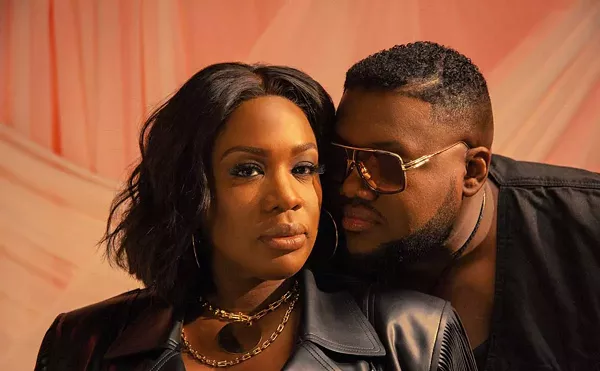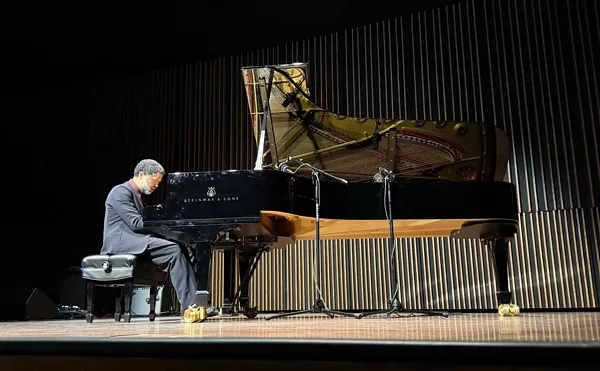
Audio By Carbonatix
[
{
"name": "GPT - Leaderboard - Inline - Content",
"component": "35519556",
"insertPoint": "5th",
"startingPoint": "3",
"requiredCountToDisplay": "3",
"maxInsertions": 100,
"adList": [
{
"adPreset": "LeaderboardInline"
}
]
}
]
The Muggs' bassist, known properly as Tony DeNardo, recently released his first proper solo album Kid Gloves under the moniker -DUDE, a splendorous neo-psychedelic pop memoir sketching feathery-fuzzed scenes spanning the whole of his 20 years in songwriting, poured, punched, lilting and charging-forth over subtly-sludged guitar riffs, warm acoustic cascades, sonorous pianos and his disarmingly honeyed voice sing-sighing this dulcet lullaby-croon.
This album not only clears DeNardo's songwriting vaults but served his need to prove himself as a songwriter. After suffering a hemorrhagic stroke in 2001, DeNardo had to relearn how to speak. In 2002 and into 03, he then had to learn a new approach to songwriting - as he never regained his right arm, a hurdle when one considers he'd always wrote on acoustic guitar, penning half of these tunes that way through the late 90's. He was able to set down the bare-bones for the rest of these albums tracks via a casio keyboard, mapping out rhythms atop which he could lay his endless stream of melodic ideas.
DeNardo's always been a "Beatles-nut," ( some of these cuts, particularly "Sweet Danielle," you'd think came from some alternate-dimension's Rubber Soul and, indeed, he admits McCartney to be a big influence), but after his stroke, his reverence for melody was crystallized when he properly got into the Beach Boys and his sensibility for gritty-psychedelic-tinged 12-bar blues when he "fell hard into the Led Zeppelin phase."
Now, part of why DeNardo counts himself so lucky is because of the instrumental/engineering contributions he received for Kid Gloves - particularly humbled by the enthusiasm of his collaborators - like producer Bobby Emmett (longtime friend, songwriter, former organist for the Sights), and other friends/fellow musicians who wanted to play, like like John Rutherford (who brought the whole Motor City Horns), or guitarist Garret Bielaniec and violinist Tania Monger.
For Gloves, DeNardo would have sessions with guitarist Thom Kondoff, voicing out the melodic sounds for the guitar part. "He'd say: 'This is your project and I just want to get it right for you.'"
He's also feeling lucky because he's, currently, so musically engaged at this point in his life. DUDE is a passion project ("and there's so many things I wanna do with this album," DeNardo said), while he currently writes/performs with two cover/tribute bands, one for WEEN (which includes Kondoff) and the other for Fleetwood Mac, while also playing with Jennifer Westwood in The Blue Collar Boys.
But then, also, DeNardo says, with complete calmness, that he's not afraid of death. "I've been so close to it that I'm really curious about it, actually."
Stroke survivors, DeNardo said, can be predisposed to future strokes and he has a constant reminder of that risk because of the mesh screen surgically implanted into his midsection to protect against blot-clots reaching his lungs.
He has been close to it, so it drives home the message: "The time is now."
"I wanted people to know, then, that I stand for something."
Tracks like "Not Exactly Where I Should Be" is a twanged-up strut-and-sway that rails against the bland monotony of corporate rock, "Two Minutes Hate," bolstered by its 70's-psyche/blues organ groove, is a 1984-inspired political pop/rock song scorching against thinly veiled totalitarian tactics engaged by world political leaders, while "In The Next Pocket" is a hand-clap-able folk/pop ditty with a sunny veneer masking a vitriolic bite at corporate corruption.
A music video for "In The Next Pocket" is currently in production - look for it online later in Spring/early summer.
Through these songs, "I hope to, eventually, be known as a spokesman for stroke survivors, but that's in time."
"I have to have a voice."
All the while, through each track, (many of them dazzling love-letters to the seminal era of Brian Wilson/McCartney-esque pastoral pop,) melody remains the key element.
"Melody is king," DeNardo says, admitting to it being the most important aspect of any song he ever sets down to write.
One of the most heartening moments of the album comes in the chorus of "Angels Watching Over Me," a steady-stepping rhythm pulses forth, punchy drums and pianos, under crunchy guitar riffs intertwining with soft, wispy backing vocals, while DeNardo's rousing, reverb-drenched vocals belt:
Every day, in every way / I have to thank you all






